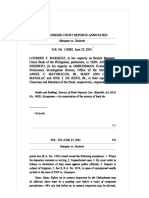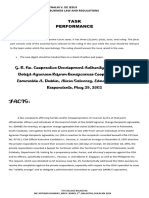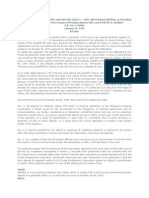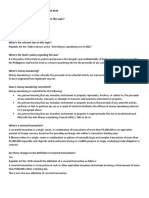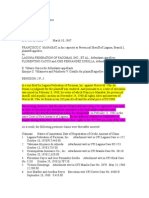Banco Filipino Vs Purisima
Banco Filipino Vs Purisima
Uploaded by
Nikki ZaideCopyright:
Available Formats
Banco Filipino Vs Purisima
Banco Filipino Vs Purisima
Uploaded by
Nikki ZaideOriginal Title
Copyright
Available Formats
Share this document
Did you find this document useful?
Is this content inappropriate?
Copyright:
Available Formats
Banco Filipino Vs Purisima
Banco Filipino Vs Purisima
Uploaded by
Nikki ZaideCopyright:
Available Formats
G.R. No. L-56429 May 28, 1988 BANCO FILIPINO SAVINGS AND MORTGAGE BAN , petitioner, vs.!ON.
FIDEL P"RISIMA, #$%., a&' !ON. VICENTE ERICTA a&' (OSE DEL FIERO, #$%., respondents.
FACTS: 1. The Customs special agent involved is Manuel Caturla, and the accusation against him was filed b the !ureau of "nternal #evenue. $. the Tanodbayan issued a subpoena duces tecum to the !anco Filipino Savings % Mortgage !an&, commanding its representative to appear at a specified time at the 'ffice of the Tanodbayan and furnish the latter with dul certified copies of the records in all its branches and e(tension offices, of the loans, savings and time deposits and other ban&ing transactions, dating bac& to 1)*), appearing in the names of Caturla, his wife, +urita Caturla, their children ,. Caturla moved to -uash the subpoena duces tecum arguing that compliance would result in a violation of Sections $ and , of the .aw on Secrec of !an& /eposits. Then Tanodbayan 0icente 1ricta not onl denied the motion for lac& of merit, and directed compliance with the subpoena, but also e(panded its scope through a second subpoena duces tecum, this time re-uiring production b !anco Filipino of the ban& records in all its branches and e(tension offices of several other persons &nown b the accused. 2. Two other subpoena of substantiall the same tenor as the second were released b the Tanodbayan's 'ffice. The last re-uired obedience under sanction of contempt. 3. The !anco Filipino Savings % Mortgage !an& filed a complaint for declarator relief with the CF" of Manila pra ed for a 4udicial declaration as to whether its compliance with the subpoenae duces tecum would constitute an infringement of the provisions of Sections $ and , of #.A. 5o. 1263 in relation to Section 7 of #.A. 5o. ,61). "t also as&ed that pending final resolution of the -uestion, the Tanodbayan be provisionall restrained from e(acting compliance with the subpoenae. *. #espondent 8udge +urisima issued an 'rder den ing for lac& of merit the application b !F !an& for a preliminar in4unction and9or restraining order. :. "t is the ban&;s theor that the order declining to grant that remed operated as a premature ad4udication of the ver issue raised in the declarator suit, and as 4udicial sufferance of a transgression of the ban& deposits statute, and so constituted grievous error correctible b certiorari. "t further argues that subpoenae in -uestion are in the nature of <fishing e(peditions< or <general warrants< since the authori=e indiscriminate in-uir into ban& records> that, assuming that such an in-uir is allowed as regards public officials under investigation for a violation of the Anti?@raft % Corrupt +ractices Act, it is constitutionall impermissible with respect to private individuals or public officials not under investigation on a charge of violating said Act> "SSA1: whether or not the <.aw on Secrec of !an& /eposits< precludes production b subpoena duces tecum of ban& records of transactions b or in the names of the wife, children and friends of a special agent of the !ureau of Customs, accused before the Tanodbayan of having allegedl ac-uired propert manifestl out of proportion to his salar and other lawful income, in violation of the <Anti?@raft and Corrupt +ractices Act.< B1./: 5'. while #epublic Act 5o. 1263 provides that ban& deposits are <absolutel confidential .. and CthereforeD ma not be e(amined, in-uired or loo&ed into,< e(cept in those cases enumerated therein, the Anti?@raft .aw directs in mandator terms that ban& deposits <shall be ta&en into consideration in the enforcement of this section, notwithstanding an provision of law to the contrar .< The onl conclusion possible is that section 7 of the Anti? @raft .aw is intended to amend section $ of #epublic Act 5o. 1263 b providing an additional e(ception to the rule against the disclosure of ban& desposits. ((( ((( ((( ... Cases of une(plained wealth 14 are similar to cases of briber or dereliction of dut 15 and
no reason is seen wh these two classes of cases cannot be e(cepted from the rule ma&ing ban& deposits confidential. The polic as to one cannot be different from the polic as to the other. This polic e(presses the notion that a public office is a public trust and an person who enters upon its discharge does so with the full &nowledge that his life, so far as relevant to his dut , is open to public scrutin . The in-uir into illegall ac-uired propert E or propert 5'T <legitimatel ac-uired< E e(tends to cases where such propert is concealed b being held b or recorded in the name of other persons. This proposition is made clear b #.A. 5o. ,61) which -uite categoricall states that the term, <legitimatel ac-uired propert of a public officer or emplo ee shall not include .. propert unlawfull ac-uired b the respondent, but its ownership is concealed b its being recorded in the name of, or held b , respondent;s spouse, ascendants, descendants, relatives or any other persons.< 16 To sustain the petitioner;s theor , and restrict the in-uir onl to propert held b or in the name of the government official or emplo ee, or his spouse and unmarried children is unwarranted in the light of the provisions of the statutes in -uestion, and would ma&e available to persons in government who illegall ac-uire propert an eas and fool?proof means of evading investigation and prosecution> all the would have to do would be to simpl place the propert in the possession or name of persons other than their spouse and unmarried children. This is an absurdit that we will not ascribe to the lawma&ers.
You might also like
- Sample Memo 1Document8 pagesSample Memo 1Mcafee LesondatoNo ratings yet
- 2022 Banking Case Digest FinalDocument18 pages2022 Banking Case Digest FinalJem PagantianNo ratings yet
- Guingona vs. CADocument4 pagesGuingona vs. CAJacob Palafox100% (2)
- 55 - Banco Filipino Savings and Mortgage Bank v. Purisima, 161 SCRA 576 (1988)Document3 pages55 - Banco Filipino Savings and Mortgage Bank v. Purisima, 161 SCRA 576 (1988)November Lily OpledaNo ratings yet
- Banking Midterms ReviewerDocument32 pagesBanking Midterms ReviewerMark Oliver EvangelistaNo ratings yet
- Provident Savings V CA GRN 97218Document5 pagesProvident Savings V CA GRN 97218Andrew Neil R. NinoblaNo ratings yet
- Philippine Deposit Insurance Corporation VsDocument2 pagesPhilippine Deposit Insurance Corporation Vslemon adeNo ratings yet
- LUIS S. WONG v. CA, GR No. 117857, 2001-02-02Document2 pagesLUIS S. WONG v. CA, GR No. 117857, 2001-02-02Thoughts and More ThoughtsNo ratings yet
- Marquez v. DesiertoDocument12 pagesMarquez v. DesiertoTon RiveraNo ratings yet
- General Banking Law of 2002Document31 pagesGeneral Banking Law of 2002Jon Raymer OclaritNo ratings yet
- White Marketing vs. Grandwood Furniture, 23 November 2016Document6 pagesWhite Marketing vs. Grandwood Furniture, 23 November 2016doora keysNo ratings yet
- Tanada v. AngaraDocument2 pagesTanada v. AngaraTet Domingo100% (2)
- 'PH Bank Secrecy Laws Strictest in The World Along With LebanonDocument12 pages'PH Bank Secrecy Laws Strictest in The World Along With LebanonjealousmistressNo ratings yet
- Case DigestDocument3 pagesCase DigestMarc Justine BoralNo ratings yet
- 2023 Assigned CasesDocument2 pages2023 Assigned CasesForro Danilo Jr.No ratings yet
- Case Digest in BankingDocument4 pagesCase Digest in BankingJong PerrarenNo ratings yet
- G.R NO. L-22977Document3 pagesG.R NO. L-22977Kylene Nichole EvaNo ratings yet
- 12 Task Performance 1 - BUSINESS LAW AND REGULATIONSDocument2 pages12 Task Performance 1 - BUSINESS LAW AND REGULATIONSRynalin De JesusNo ratings yet
- PDIC V CA, Abad (2003)Document8 pagesPDIC V CA, Abad (2003)lawNo ratings yet
- Ra 3765Document2 pagesRa 3765Maria Salee MoraNo ratings yet
- SO Vs PDICDocument2 pagesSO Vs PDICLenette LupacNo ratings yet
- BPI Vs de Reny Fabric Industries Inc, 35 SCRA 253Document2 pagesBPI Vs de Reny Fabric Industries Inc, 35 SCRA 253Courtney TirolNo ratings yet
- Gonzales vs. Hechanova, G.R. No. L-21897, October 22, 1963Document10 pagesGonzales vs. Hechanova, G.R. No. L-21897, October 22, 1963Jelena SebastianNo ratings yet
- Case Digests 3Document18 pagesCase Digests 3Judith Eliscia YacobNo ratings yet
- PNB Vs Villa Digest and Full CaseDocument9 pagesPNB Vs Villa Digest and Full CaseAnonymous uQ6IcqNo ratings yet
- 01 - ALCORAN - Rubi v. Provincial Board of MindoroDocument3 pages01 - ALCORAN - Rubi v. Provincial Board of MindoroLeynard AlcoranNo ratings yet
- Ledda V BpiDocument6 pagesLedda V BpiPaul de PhoenixNo ratings yet
- Joseph Victor G. Ejercito vs. Sandiganbayan (Special Division) and People of The PhilippinesDocument2 pagesJoseph Victor G. Ejercito vs. Sandiganbayan (Special Division) and People of The PhilippinesRey-An TrinidadNo ratings yet
- BPI Vs IACDocument1 pageBPI Vs IACcmv mendozaNo ratings yet
- MWSS Vs Hon. DawangDocument2 pagesMWSS Vs Hon. DawangArahbellsNo ratings yet
- China Banking Corporation and Tan Kim LiongDocument3 pagesChina Banking Corporation and Tan Kim LiongVictoria AlexanderNo ratings yet
- Ejercito vs. SandiganbayanDocument2 pagesEjercito vs. SandiganbayanMichelle Vale CruzNo ratings yet
- Chase Vs CFI of Manila (The Taliño)Document2 pagesChase Vs CFI of Manila (The Taliño)AlexandraSoledadNo ratings yet
- TCC Amla HandoutDocument4 pagesTCC Amla HandoutVince TarucNo ratings yet
- Bank of The Philippine Islands v. YuDocument2 pagesBank of The Philippine Islands v. YucelestialfishNo ratings yet
- China Banking Corp vs. CA - GR No.140687Document13 pagesChina Banking Corp vs. CA - GR No.140687Leizl A. VillapandoNo ratings yet
- Marquez v. Desierto, G.R. No. 135882Document1 pageMarquez v. Desierto, G.R. No. 135882Rhenfacel ManlegroNo ratings yet
- Bpi Vs Iac 164 Scra 630 1988Document5 pagesBpi Vs Iac 164 Scra 630 1988ShielaMarie MalanoNo ratings yet
- Wellex Group VS SandiganbayanDocument11 pagesWellex Group VS SandiganbayanJairus RubioNo ratings yet
- Tanada Vs AngaraDocument3 pagesTanada Vs AngaraTOMATONo ratings yet
- GR 155076 2006Document2 pagesGR 155076 2006Peter Paul Recabo100% (1)
- Nov 5Document66 pagesNov 5dollyccruzNo ratings yet
- Nego Transcript 405 2013-2014 TRWEDocument90 pagesNego Transcript 405 2013-2014 TRWEalyza burdeosNo ratings yet
- Bank of The Philippine Islands vs. de Reny Fabric Industries, Inc., 35 SCRA 253 (1970)Document2 pagesBank of The Philippine Islands vs. de Reny Fabric Industries, Inc., 35 SCRA 253 (1970)Robinson MojicaNo ratings yet
- BDO-EPCI vs. JAPRL DevelopmentDocument1 pageBDO-EPCI vs. JAPRL DevelopmentHannah SyNo ratings yet
- Pal vs. CaDocument1 pagePal vs. CaattymaryjoyordanezaNo ratings yet
- PHILIPPINE COMMERCIAL INTERNATIONAL BANK (Formerly INSULAR BANK OF ASIA AND AMERICA), Petitioner, vs. COURT OF APPEALS and FORD PHILIPPINES, INC. and CITIBANK, N.A., Respondents.Document7 pagesPHILIPPINE COMMERCIAL INTERNATIONAL BANK (Formerly INSULAR BANK OF ASIA AND AMERICA), Petitioner, vs. COURT OF APPEALS and FORD PHILIPPINES, INC. and CITIBANK, N.A., Respondents.Karen PascalNo ratings yet
- Reyes vs. Court of Appeals G.R. No. 118492, August 15, 2001Document2 pagesReyes vs. Court of Appeals G.R. No. 118492, August 15, 2001shortsandcutsNo ratings yet
- Vintola vs. IBAADocument6 pagesVintola vs. IBAAKayelyn LatNo ratings yet
- Banas Vs Asia Pacific - GraceDocument3 pagesBanas Vs Asia Pacific - GraceMary Grace G. EscabelNo ratings yet
- (G.R. No. L-22405. June 30, 1971) Case DigestDocument1 page(G.R. No. L-22405. June 30, 1971) Case DigestRusty NomadNo ratings yet
- BPI vs. Quiaoit, 16 January 2019Document2 pagesBPI vs. Quiaoit, 16 January 2019Jerry SantosNo ratings yet
- Case DigestsDocument54 pagesCase DigestsJudith Eliscia YacobNo ratings yet
- Payable To Bearer-Pnb v. RodriguezDocument2 pagesPayable To Bearer-Pnb v. RodriguezNikki Estores GonzalesNo ratings yet
- Xix. Union Bank vs. Court of Appeals, 23 December 1999 - Bank SecrecyDocument1 pageXix. Union Bank vs. Court of Appeals, 23 December 1999 - Bank SecrecyZora IdealeNo ratings yet
- Perez Vs Monetary BoradDocument2 pagesPerez Vs Monetary BoradchespacoNo ratings yet
- Petitioner vs. Respondent: Philippine Savings Bank, SakataDocument14 pagesPetitioner vs. Respondent: Philippine Savings Bank, Sakatamarie janNo ratings yet
- GalvezDocument1 pageGalvezellaNo ratings yet
- Marquez VsDocument12 pagesMarquez VsD Del SalNo ratings yet
- Manabat v. Laguna FederationDocument3 pagesManabat v. Laguna FederationKristineSherikaChyNo ratings yet
- Petitioner vs. vs. Respondents: First DivisionDocument5 pagesPetitioner vs. vs. Respondents: First DivisionjackyNo ratings yet
- 10 - China Bank v. Ortega (GR L-34964, 31 January 1973)Document4 pages10 - China Bank v. Ortega (GR L-34964, 31 January 1973)Bj CaridoNo ratings yet
- Approving Manager To Look Into" Unfortunately, It Was A "Petty Thing," Like The Incorrect AccountDocument2 pagesApproving Manager To Look Into" Unfortunately, It Was A "Petty Thing," Like The Incorrect AccountNikki ZaideNo ratings yet
- CIR V Manila Mining DigestDocument2 pagesCIR V Manila Mining DigestNikki ZaideNo ratings yet
- Davao Light V CADocument3 pagesDavao Light V CANikki ZaideNo ratings yet
- Yasin V Sharia CourtDocument1 pageYasin V Sharia CourtNikki Zaide100% (1)
- American Home Assurance Company Vs CADocument4 pagesAmerican Home Assurance Company Vs CAKiz AndersonNo ratings yet
- Cadalin vs. PoeaDocument26 pagesCadalin vs. PoeaEsli Adam Rojas50% (2)
- 18 06 18 Camp ComplaintDocument18 pages18 06 18 Camp ComplaintFlorian Mueller100% (1)
- Ethics TermpaperDocument11 pagesEthics TermpaperThea Mae Morgia WacasNo ratings yet
- Art1933 1961Document59 pagesArt1933 1961Yoonhae LeeNo ratings yet
- 14 - Perez v. Monetary Board 20 SCRA 592Document2 pages14 - Perez v. Monetary Board 20 SCRA 592November Lily Opleda50% (2)
- Abas Kida v. SenateDocument2 pagesAbas Kida v. SenateWilson Morano100% (1)
- COL ScriptDocument3 pagesCOL ScriptArahbellsNo ratings yet
- Hiyas vs. JudgeDocument1 pageHiyas vs. JudgeJade CanadaNo ratings yet
- Edwin Belz Amended Motion To Vacate Paying Attorney FeesDocument4 pagesEdwin Belz Amended Motion To Vacate Paying Attorney FeesElder Abuse AdvocateNo ratings yet
- Labor Relations Seious Misconduct Part 2Document331 pagesLabor Relations Seious Misconduct Part 2Kimi MilagNo ratings yet
- Bhagwan Das V GirdharilalDocument7 pagesBhagwan Das V GirdharilalMd MujtabaNo ratings yet
- Rasdas v. EstenorDocument2 pagesRasdas v. EstenorHezroNo ratings yet
- Bar Questions FOR AGENCY TRUST AND PARTNDocument5 pagesBar Questions FOR AGENCY TRUST AND PARTNKaifa DiazNo ratings yet
- Arguments Concerning Abolotion of Privy CouncilDocument11 pagesArguments Concerning Abolotion of Privy CouncilShanikea RamsayNo ratings yet
- Thou Shalt Not Sue - Recent Developments To The Scope of Anti-Suit Injunctions in Singapore and England - The Singapore Law GazetteDocument12 pagesThou Shalt Not Sue - Recent Developments To The Scope of Anti-Suit Injunctions in Singapore and England - The Singapore Law Gazettebernard.chungNo ratings yet
- Hitfield ArrabeeDocument12 pagesHitfield ArrabeeGrant SternNo ratings yet
- Deck Carriage DefinitionsDocument40 pagesDeck Carriage Definitionsdlight0No ratings yet
- NathanDocument1 pageNathanAkash Dhiman100% (1)
- CIR V Philippine Global CommunicationDocument3 pagesCIR V Philippine Global CommunicationdorianNo ratings yet
- Salaw v. NLRC (Digest: Labor)Document2 pagesSalaw v. NLRC (Digest: Labor)Dany AbuelNo ratings yet
- Emergency Loan Pawnshop Incorporated vs. Court of AppealsDocument2 pagesEmergency Loan Pawnshop Incorporated vs. Court of AppealsVeronica ChanNo ratings yet
- Non-Party James P. King, Accountant For Dr. Jerome Swartz, Memorandum in Opposition To Motion To Compel Discovery.Document26 pagesNon-Party James P. King, Accountant For Dr. Jerome Swartz, Memorandum in Opposition To Motion To Compel Discovery.MongooseNo ratings yet
- Elements of A Decree: Civil Procedure Code 1908, 2 (2) ,,mst. Chauli v. Mst. Meghoo, MANU/UP/0069/1944: AIR 1945 All 268Document6 pagesElements of A Decree: Civil Procedure Code 1908, 2 (2) ,,mst. Chauli v. Mst. Meghoo, MANU/UP/0069/1944: AIR 1945 All 268Nidhi GuptaNo ratings yet
- A Critical Evaluation of The Dual Doctrines of Subrogation & Contribution in Fire InsuranceDocument11 pagesA Critical Evaluation of The Dual Doctrines of Subrogation & Contribution in Fire InsurancePriyadharshini ANo ratings yet
- (h10) - Sulpicio Lines Inc. Vs CADocument3 pages(h10) - Sulpicio Lines Inc. Vs CAMhaliNo ratings yet
- Washington v. Defense Distributed - Response To Temporary Restraining OrderDocument71 pagesWashington v. Defense Distributed - Response To Temporary Restraining OrderjoshblackmanNo ratings yet
- 33 Various AssessmentsDocument9 pages33 Various AssessmentsVijay Patel InumulaNo ratings yet








